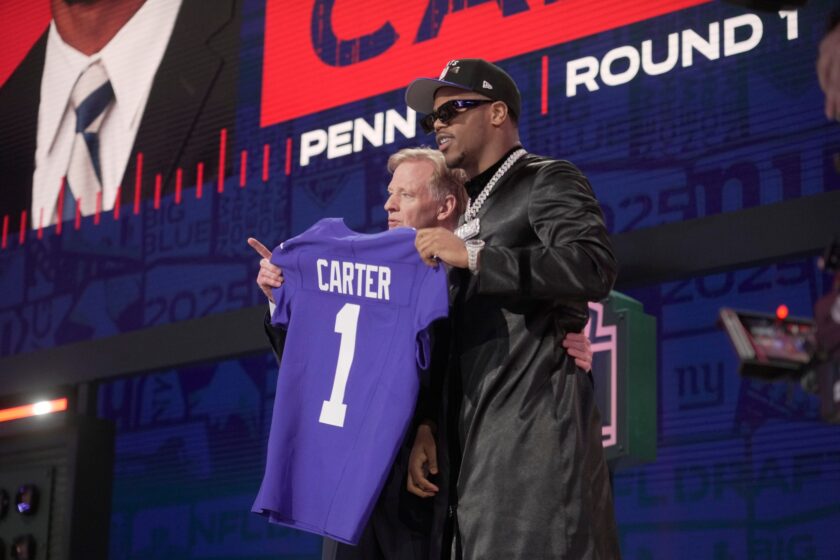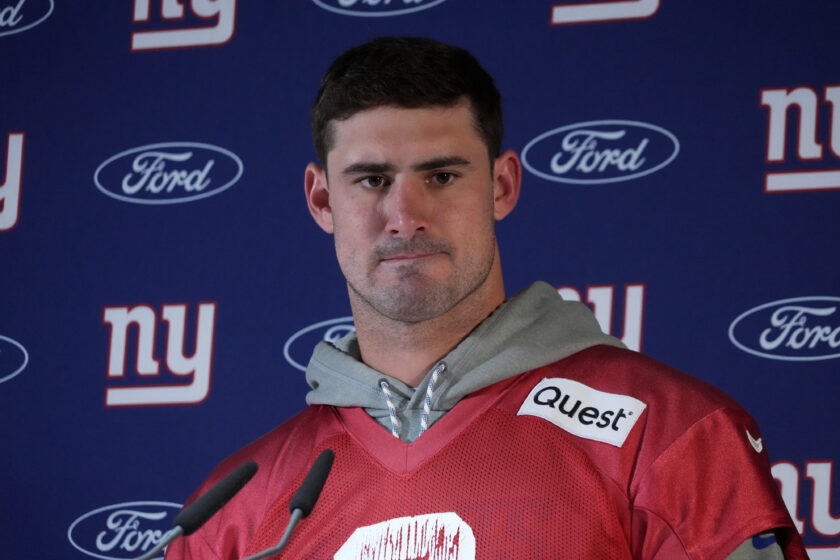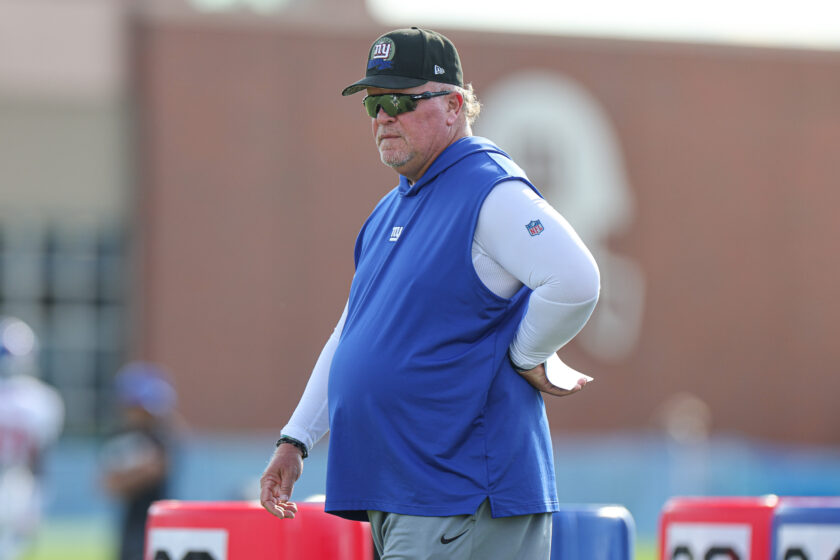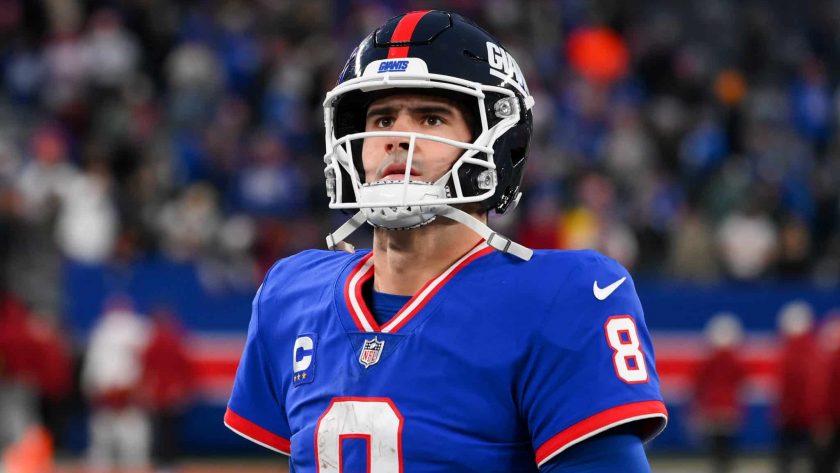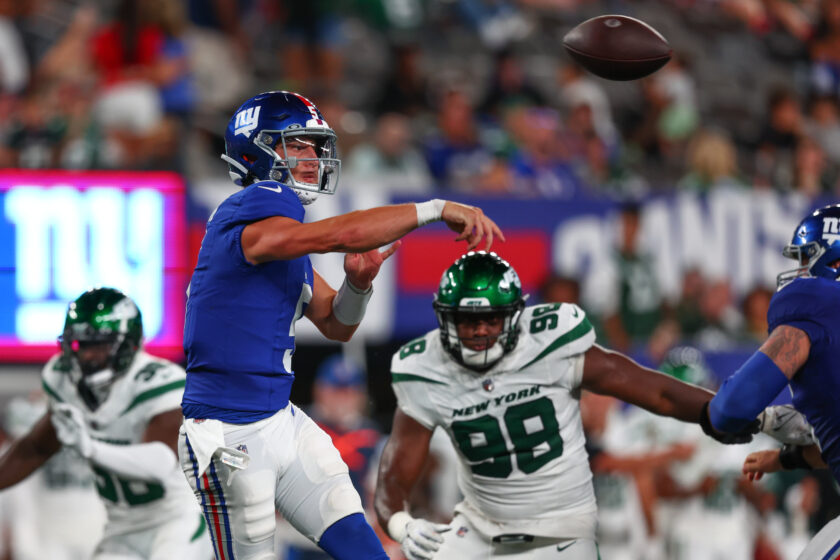An Eli Manning 2012 timeout mirrors his New York Giants career
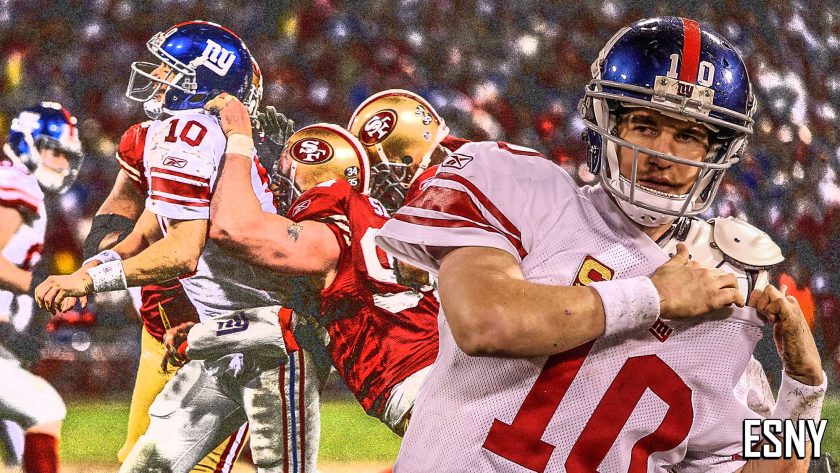
An Eli Manning timeout attempt during the 2011 NFC Championship Game mirrors the two-time champion’s New York Giants career.
The 2011 NFC Championship Game was tied at 17 between the New York Giants and San Francisco 49ers. The Giants were at midfield with 43 seconds to go in regulation on second down with eight yards to go. Eli Manning spun to his left, dumped a pass off to Ahmad Bradshaw, and got leveled by Aldon Smith on what would easily be—and should have been—a roughing the passer penalty today.
Bradshaw failed to get out of bounds, so the Giants had to call a timeout, which granted the greatest Manning Face of all time:
His mouthpiece stood pat on his nose. His shoulder pad hung out from outside of his jersey. According to FOX’s broadcast, it was the ninth time he had been knocked down by the Niners, and the 16th time he had been hit. He got hit four more times and knocked down another three times, including a sack.
Manning took arguably the biggest physical beating of his career at Candlestick Park that day.
And yet, along with a stout defense, he helped the Giants to the National Football Conference title in that overtime victory, sending them to Indianapolis for what would become the quarterback’s second Super Bowl victory.
To put it nicely, Manning was goofy.
More often than not, he just looked lost.
Like, what is this?
Even when his brother was about to win his second Super Bowl, he just, wasn’t there in the celebration.
If you simply Google “Eli Manning gifs,” you’ll be entertained for a while.
But no matter the face, no matter what kind of beating he took in his 236 games played, Giant fans never had to question if Manning would be declared OUT of that week’s game.
Before the ill-fated decision to bench Manning for Geno Smith against the Oakland Raiders in 2017, he started 210 consecutive games—220 including the postseason. After that debacle, he started the Giants’ next 22 games under center, until being benched for the team’s first pick of 2019, Daniel Jones.
In his regular-season career, Manning started in 234 of a possible 256 games. He was the backup to Kurt Warner for the first nine of those 256. Then, the streak came to a scorching, shocking and completely unacceptable halt so the Giants could get a glimpse of Smith that lasted all of one week.
And then Jones took the starting job from Week 3 of this past season to Week 13 before injury, thus bringing Manning back in for his farewell, before Jones returned from his high-ankle sprain in Week 16.
It took the rookie 10 starts to miss a game due to injury. Not one of Manning’s DNP’s preceded the word “injury” or any body part.
Manning never wound up on that game’s injury report.
That, along with the fact that only 12 quarterbacks have been sacked more than him, makes Manning’s feats much more impressive. Manning was always listed as ACTIVE.
If he did not play, it was a coach’s decision.
The toughness, longevity and tenacity Manning showcased in his 16 years in New York is super rare in sports. Manning’s durability should not be taken for granted by Giant fans and football fans alike.
There was that one time where Manning had to receive 12 stitches after taking a facemask into his forehead against the Jets in a preseason game. But he had the stitches removed and returned to practice just five days later.
But that moment—Manning calling a timeout, looking totally disheveled with plenty of grass stains and his equipment seemingly severed, having been knocked down once again, and not for the last time in that game, and then clinching a trip to the Super Bowl—is his career in a nutshell.
Manning was this generation’s true ironman of football—his best ability was his availability. It was a guarantee that Eli Manning would not come up short on effort on game day. It was a lock that he would not walk off the field hurt and be out for the remainder of the game.
He was walking off with all the blades of grass and turf pellets he could find.
Manning took his fair share of hits. He was sacked 411 times—108 times more than his brother, in 10 fewer games.
Even in his mid-to-late 30s, when It can be argued that a new quarterback was long overdue, he took the hits. To make matters worse, he won eight games in 2017 and 2018 combined while facing faster, bigger, and stronger defensive linemen than his first few years in the National Football League.
One could always bank on Manning to give whatever it took to win.
And he would always have one hell of a face doing it. They were all so beautiful.

